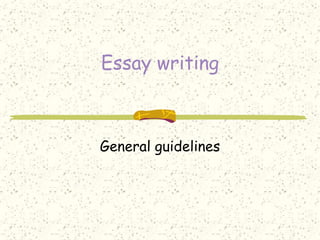
Essay writing 1
- 2. The planning stage This is one of the most important stages. Therefore, it should not be overlooked. Planning involves brainstorming ideas and looking for references in the text(s) to back up your points. Be realistic. If you are given a limited number of words to write, be careful to choose the number of ideas you can develop thoroughly. It is not a good idea to simply mention loose points. It is always best to focus on a reasonable number of items which you are sure you can deal with in detail.
- 3. Pre-writing 1. Research: Begin the essay writing process by researching your topic, making yourself an expert. Utilize the internet, the academic databases, and the library. Take notes and immerse yourself in the words of great thinkers.
- 4. Pre-writing 2. Analysis: Now that you have a good knowledge base, start analyzing the arguments of the essays you're reading. Clearly define the claims, write out the reasons, the evidence. Look for weaknesses of logic, and also strengths. Learning how to write an essay begins by learning how to analyze essays written by others.
- 5. Pre-writing 3. Brainstorming: Your essay will require insight of your own, genuine essay-writing brilliance. Ask yourself a dozen questions and answer them. Meditate with a pen in your hand. Take walks and think and think until you come up with original insights to write about.
- 6. Pre-writing 4. Thesis: Pick your best idea and pin it down in a clear assertion that you can write your entire essay around. Your thesis is your main point, summed up in a concise sentence that lets the reader know where you're going, and why. It's practically impossible to write a good essay without a clear thesis
- 7. Pre-writing 5. Outline: Sketch out your essay before straightway writing it out. Use one-line sentences to describe paragraphs, and bullet points to describe what each paragraph will contain. Play with the essay's order. Map out the structure of your argument, and make sure each paragraph is unified.
- 8. Layout and organisation The basic layout of an essay is as follows: a) Introduction b) Development c) Conclusion. In the introduction you are simply supposed to announce what is going to be discussed in your essay. Do not include conclusions; this will give the reader no purpose to go on reading. Do your best to create interest in your audience.
- 9. In the development, which will be the longest section, you will deal with each one of the topics in detail. You should devote a paragraph to each one of your ideas. Remember, a paragraph is an idea i.e do not write a single paragraph or one-sentence paragraphs.
- 10. In the conclusion simply round off the ideas you developed. Make sure you have dealt with what you promised in the introduction. Look out for contradictions or inconsistencies.
- 11. Editing Once you have written out the whole essay, read it several times for different purposes. At first, check for clarity and coherence and cohesion. Secondly, look out for language mistakes. Thirdly, make sure the style is suitable.
- 12. General ideas to be taken into account Do NOT use contractions unless you are quoting. Use the present tense. When you decide to use a quotation, make sure you introduce it. For example, “In Frankenstein, the roles of creator- creature are reversed. We can clearly see this in...”. Do not use quotations unless there is a clear purpose for using them. Remember, quotations should only be used to illustrate your point.
- 13. If the quotation is too long, paraphrase it. Do not make use of literary terms unless you mention the purpose these devices serve. Do not say, for example, this is a good example of personification, if you cannot see what the effect is. Simply mentioning literary devices will not make your essay more successful.
- 14. Remember to acknowledge your sources if you use any, even if you are paraphrasing and not quoting verbatim. Include a list of bibliography and/ or webliography at the end of your essay. Do not fall into the tempation of retelling the text. The reader is already familiar with it. You may only do so when introducing a quotation.
- 15. And last but not least!!! Remember that what matters most is how you respond to the text. There are no right or wrong answers only rightly or wrongly developed ones. As long as you can account for your answers and use the text for support, your ideas will be accepted.
- 16. GOOD LUCK AND ENJOY THE EXPERIENCE!!!